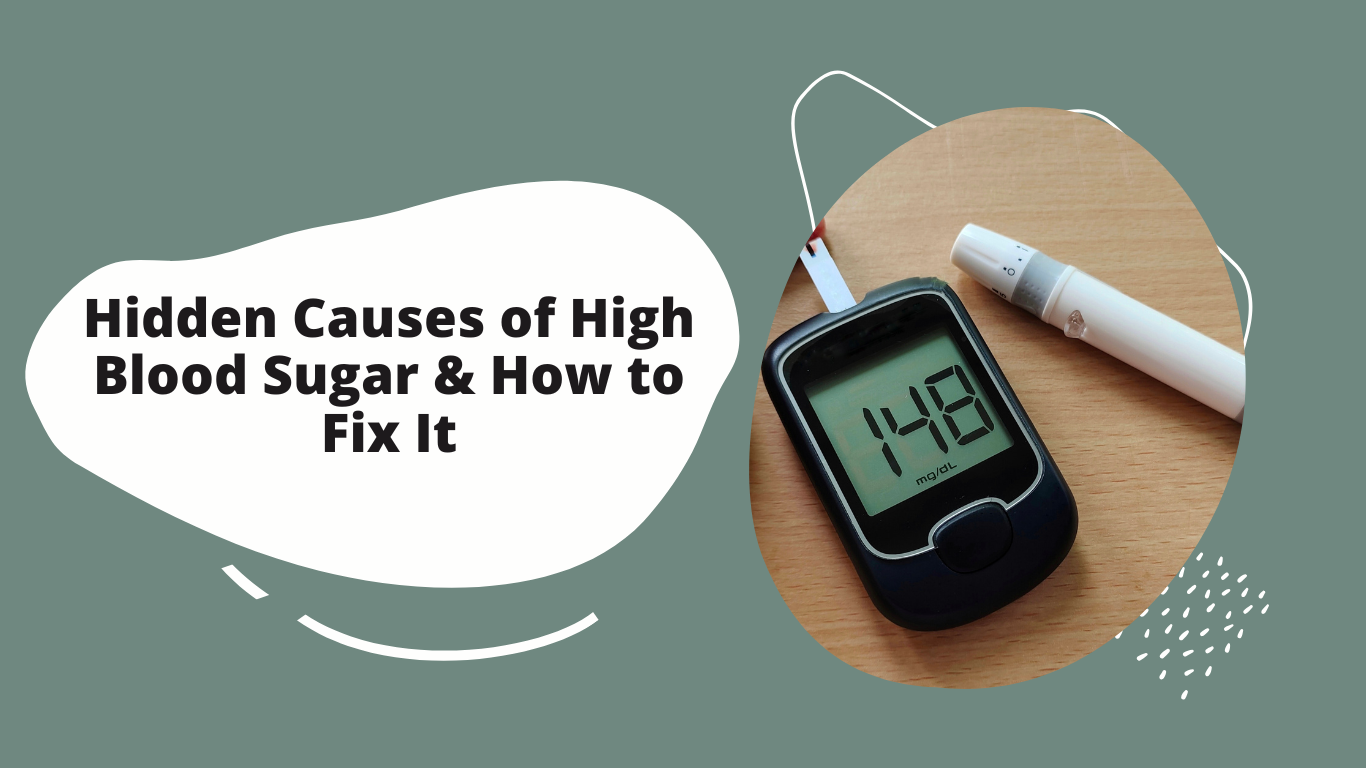Hidden Causes of High Blood Sugar & How to Fix It

Introduction
Managing blood sugar isn’t just about avoiding sugar; many hidden factors can silently push your glucose levels higher without you realizing it. Even with the best intentions, common habits, overlooked health issues, and dietary choices may be working against you.
In this article, we uncover the hidden causes of high blood sugar and provide actionable solutions to help you take control of your health.
1. Lack of Sleep
How It Affects Blood Sugar
When you don’t get enough sleep, your body produces more cortisol, a stress hormone that raises blood sugar levels. Lack of rest also makes insulin less effective, increasing the risk of insulin resistance.
How to Fix It
- Aim for 7–9 hours of quality sleep each night.
- Establish a relaxing bedtime routine.
- Avoid screens before bed and limit caffeine intake in the evening.
2. Stress & Anxiety
How It Affects Blood Sugar
When stressed, your body releases hormones like cortisol and adrenaline, which trigger glucose release into the bloodstream to provide extra energy.
How to Fix It
- Practice stress-reducing activities like meditation, deep breathing, and gentle exercise.
- Maintain a consistent daily routine to reduce uncertainty.
- Stay hydrated and eat balanced meals to keep energy levels stable.
3. Dehydration
How It Affects Blood Sugar
When you’re dehydrated, your blood becomes more concentrated, leading to higher glucose levels. Dehydration can also reduce insulin efficiency.
How to Fix It
- Drink enough water daily (at least 2–3 liters for most adults).
- Avoid excessive caffeine and sugary drinks that dehydrate you.
- Eat water-rich foods like cucumbers, oranges, and watermelon.
4. Hidden Sugars in ‘Healthy’ Foods
How It Affects Blood Sugar
Many processed foods marketed as “healthy” or “low-fat” contain hidden sugars that spike blood glucose levels.
How to Fix It
- Read nutrition labels carefully and avoid ingredients like corn syrup, fructose, and sucrose.
- Stick to whole, natural foods instead of processed options.
- Use natural sweeteners like stevia or monk fruit instead of refined sugar.
5. Skipping Meals
How It Affects Blood Sugar
Going long periods without eating can cause blood sugar to drop, leading to cravings and overeating later. This can trigger glucose spikes when you finally eat.
How to Fix It
- Eat regular, balanced meals with fiber, protein, and healthy fats.
- Carry healthy snacks like nuts, seeds, and low-carb fruits to avoid long gaps between meals.
- Avoid binge eating after fasting too long.
6. Medications & Supplements
How They Affect Blood Sugar
Certain medications, including steroids, antidepressants, and even some decongestants, can raise blood sugar levels.
How to Fix It
- Consult your doctor about possible blood sugar effects of your medications.
- If necessary, discuss alternative treatments with your healthcare provider.
- Monitor your blood sugar regularly to detect changes early.
7. Gut Health Imbalances
How It Affects Blood Sugar
Poor gut health can lead to inflammation and insulin resistance, making it harder to maintain stable glucose levels.
How to Fix It
- Eat probiotic-rich foods like yogurt, kefir, and fermented vegetables.
- Increase fiber intake to support healthy digestion.
- Reduce processed foods that harm gut bacteria balance.
8. Lack of Physical Activity
How It Affects Blood Sugar
Sitting for long hours slows down glucose metabolism, making it easier for blood sugar to stay elevated.
How to Fix It
- Incorporate daily movement, even if it’s just walking after meals.
- Engage in strength training or aerobic exercise to improve insulin sensitivity.
- Break up long periods of sitting by standing and stretching every hour.
Frequently Asked Questions (FAQs)
1. Can I lower blood sugar without medication?
Yes! A combination of diet, exercise, hydration, and stress management can naturally support healthy glucose levels.
2. How fast can I see improvements?
Everyone is different, but consistent lifestyle changes can show results within weeks.
3. What foods stabilize blood sugar the best?
Focus on high-fiber, low-carb foods like leafy greens, nuts, seeds, lean proteins, and healthy fats.
4. How often should I check my blood sugar?
If managing diabetes or prediabetes, check as recommended by your doctor. Otherwise, regular monitoring can help identify trends and problem areas.
Final Thoughts
High blood sugar isn’t just about sugar consumption—many hidden factors can contribute to it. By identifying and addressing these lesser-known causes, you can take control of your health and maintain stable glucose levels.
Start making small, consistent changes today, and your body will thank you!
📌 Ready to take charge of your blood sugar?
Click [HERE] to explore natural solutions for blood sugar management!
